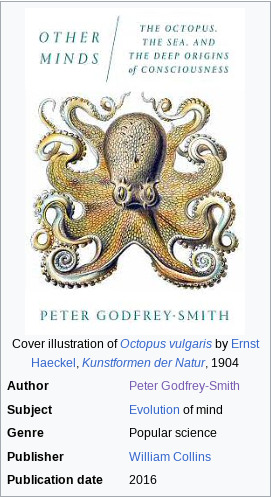Leaderboard
Popular Content
Showing content with the highest reputation since 05/09/24 in Posts
-
I've wondered about octopus intelligence because of their intelligent behavior (they test smarter than human toddlers, in some respects) and also things like having the highest encephalization quotient of any invertebrate, a degree of synaptic plasticity more associated with learning and memory centers of vertebrates, sophisticated control of 5 different types of chromatophores, and the whole "embodied" brain thing which is so unlike vertebrates. My guess is that they do have a unique form of intelligence that we are only starting to be able to measure. I have wondered if someday we discover that they are able to use chromatophores as a sophisticated language system, and not just for camouflage or basic emotions. Half a billion neurons is a lot, when you are invertebrate and weigh 6-20 lb. Another factor is that they are both predators and prey. This dual role usually makes more higher overall intelligence in the animal kingdom.3 points
-
In this video an octopus appears to lead a woman to a small cashe' of human artifacts including a photo of a human. Is it a reasonable conclusion that the octopus realized the possible value of a picture of a human or somehow thought a human would be interested in a picture of a human or even that the octopus connected the artifacts with the human due to the picture? If this is accurate it raises some real questions about just how intelligent an octopus really is. The video is 01:34 long, in my experience I've seen octopus do some unbelievable things but I never was able to decide if it was my own perspective that decided the octopus was acting as an intelligent agent or if the octopuses actions were actually intelligent independent of my own perception of its actions?2 points
-
The light clock experiment with 2 light clocks( red and blue) starting at the same point: The expanding circles highlight how the the light pulses travel at c. The same experiment, but now, we are "riding along" the blue light clock. From the inertial frame where the red clock is stationary, the blue clock ticks slower, and the from the inertial frame where the blue clock is stationary, the red clock ticks slower. Keep in mind this is the same scenario, just viewed from different inertial frames of reference.2 points
-
What does that have to do with physics ? Simply put the reason cosmological redshift exists has nothing to do with probability but is a direct consequence of expansion due to thermodynamics. There is no guess work involved. The further an object is from us the greater the cosmological redshift value will be. That will not change due to some hypothetical probability. Just as there is no guess work behind expansion being homogeneous and isotropic. Physics isn't guess work. Its careful examination of observational evidence combined with mathematics to describe what is observed. Its not random guesses or mere logic games. That has been repeatably mentioned this thread. Any object you measure at the limit of any telescope will have the corresponding redshift to distance relation. That isn't based on any guesswork but is simply put what has been shown through all observational evidence. For example using one equation I was able to show your guesswork incorrect with regards to the SMBH. You could easily have done the same thing. The formula for Newtons gravitational law is extremely easy to use. If you spent more time studying why cosmology states what it does and learn how the thermodynamic laws are involved in expansion you would be far better off. Simply put expansion is easy to understand once you look at those equations of state I posted earlier.2 points
-
You can be a scientist but not publish very much; it depends on your circumstances. Not every scientist lives in the "publish or perish" world of academia. In any event, he has a number of journal publications in the last 30 years. here are three from <20 years back The Faint-End Slopes of Galaxy Luminosity Functions in the COSMOS Field C. T. Liu et al., 2008, Astrophysical Journal Letters, v.672, p.198 COSMOS: Hubble Space Telescope Observations N. Scoville et al., 2007, Astrophysical Journal Supplement, v.172, p.38 The Cosmic Evolution Survey (COSMOS): Overview N. Scoville et al., 2007, Astrophysical Journal Supplement, v.172, p.1 I'd like a citation on that "fact" IMO no, but it also depends on the level of discussion. If you aren't supposed to discuss things outside of your area of expertise we'd have to disband SFN. i.e. you can still know certain things and discuss them despite not being an expert. The issue is knowing your limits and recognizing when you are out of your depth. We aren't aware of serotonin and dopamine? That's news to me. Your summary sounds like he was making general statements, which doesn't require expertise. It's wrong in the same sense that all science discussion is wrong - there's always more detail, and general statements always have caveats. But if you object to general statements, you'd have to eliminate almost all discussion.2 points
-
That is, essentially, what any method that slightly slows the asteroid does. Hit it frontally with a kinetic weapon, it slows a tiny bit, thus arriving at the impact point a tiny bit later...and Earth has moved slightly farther along in its orbital path. You "moved Earth out of the way." 😀2 points
-
! Moderator Note Do not, under any circumstances, take it to PM. Just cease and desist with the pot-stirring and stick to the topic under discussion2 points
-
As is true for everyone Likewise, we’d like to know your ideas are on solid footing before we waste time learning the subsequent details. e.g. you claim a neutron is an electron magnetically bound to a proton. If that’s a basis for your ideas, I’d like you to justify it. Because if you can’t, i.e. it’s bogus, then anything built on it is bogus as well.2 points
-
Just read the posts made in response to you up to this point and look for the sentences with a question mark at the end.2 points
-
Oh my ... I do believe we have a childish feud going, which now threatens to derail a second thread. Please take it to PM, or one of you travels to the other's location and you both put on boxing gloves, and step in a ring.2 points
-
Well if you care to research the merits and disadvantages the technique is called gravity tractor. https://en.m.wikipedia.org/wiki/Gravity_tractor#:~:text=The gravitational force of a,the vehicle nor its expelled Like every potential solution there is advantages and disadvantages. So really the choice of method depends on several factors. Asteroid mass, composition. Amount of correction needed and time to provie the correction is some of those factors. Here is a research article on the technique. https://arxiv.org/pdf/physics/0608157 This method doesn't require the asteroid composition, rotation and surface properties. It really only requires trajectory, and mass terms along with sufficient time and obviously communication with said craft for course corrections etc. Those are the main advantages the disadvantage is the communication requirement , sufficient fuel and a slow process that requires a large amount of time so early warning is a priority for the method to have sufficient time. However the method works with asteroids with rotation which negates numerous other methods. (Or complicates).2 points
-
2 points
-
I'm no chemist, but I would think nothing (or everything) is intrinsically 'deadly'. Doesn't the 'deadliness' come from level of exposure? In a small enough dose nothing will kill us, and in a large enough dose everything will kill us.1 point
-
So some deadly esoteric chemical we're unlikely to ever come in contact with is more dangerous than the common but deadly chemical that is in nearly everything we eat?1 point
-
Before you can tax anyone, the money must first exist. There has to be an economy in place. First, you have an territory with a particular location, climate and geography. Next, you have in your territory a specific number of people of a particular ethnicity, demographic and culture. Start with the basics. Google Earth can help locate your fictional country. Once you have the place, you'll know the resources, settlement, energy and transportation options. Then, you have to invent or borrow a history for that nation. Was it always a sovereign nation, or is it and emancipated colony - if the latter, by what means was independence gained? Or is it uninhabited and you're leading a diaspora to settle it? Have you considered the form of government? You need a constitution to lay out the principles on which the country is governed. If you really want to do this thought-project, think like a world-builder.1 point
-
If memory serves there was someone who had an artificial island (WWII radar station, or something like that) in international waters who declared themselves to be a sovereign nation. <pause> found it https://en.m.wikipedia.org/wiki/Principality_of_Sealand One of the issues this points out is that other countries can just ignore your sovereignty claims.1 point
-
Feynman. But the context, and the whole message, matters a great deal. He immediately discusses comparing the guess with experiment to test it. If it disagrees with experiment, it’s wrong. If all you have is a guess, it’s not science. https://fs.blog/mental-model-scientific-method/1 point
-
That is really true, I beat oxy but sugar is on ongoing battle, I doubt I will ever really win. I have managed to reverse my type 2 diabetes1 point
-
There are going to be steps needed by anyone trying to form a micronation, like acquiring the land. This is a tough step considering no existing country wants to give up good territory. It may be easier to suppose you can just build an island in an appropriate place. Then there are steps (you mentioned some) that are unique to your new country, like your energy and transportation infrastructure, economy, and port systems. Are you a democracy or something else? One of the most important considerations is how you'll deal with other countries. Do you want open trade or do you want to protect your own manufacturers? It might be interesting to focus this discussion on how a new country like this could attract people to be citizens. What policies would you draft that would be most attractive to the people you want to populate your country?1 point
-
I quit eating sugar almost a year and a half ago, its made a big difference in my life, my cognition has improved, I've lost weight, I feel physically better than I did. I'd recommend to anyone to stop, you have to be ruthless, HFCS is in everything, sometimes hidden quite well. I eat very little sugar now, if I do its mostly in the form of honey or brown sugar and very little of it, almost no white sugar except in the tiny amount of bread I eat. I've cut carbs about as far as I can and still eat. Pumpernickel rules!1 point
-
1 point
-
There is also a lot of individual variation. Some of my dogs seeing a mirror the first time were at least curious, others basically immediately dismissed, one of the dumber ones barked a few times before realizing that no one else was reacting and so on. One of the issues that are often not documented (because they don't make a good hypothesis-driven paper) is that animals fail tasks because they are simply not interested.1 point
-
Dimethylmercury doesn't have many uses because of its toxicity. It can pass through layers of protective gloves. Scientist Karen Wetterhahn was a killed by it. IIRC handling protocols were changed after her death.1 point
-
Very interesting points. I don't seem to remember (or successfully google up) the name of a very influencial biologist (American/Australian/British...?) who called for more attention to cephalopods, and proposed to study them as models of radically different body plans that could be the basis of intelligent multicellular life other than mammalian. I'm sure you know who I'm talking about... Very interesting topic btw.1 point
-
I would like to ask if Gluons are affected by the Higgs field in the same way as atoms. I've watched PBS video about the possibility that the Higgs field doesn't engage all particles equally but the specifics weren't clear.1 point
-
There are gauge bosons (particles mediating the interactions) that acquire mass via the Higgs mechanism though. The W and Z bosons of the weak interaction are the famous example, because they were the first particles for which the Higgs-Kibble-Anderson-etc mechanism was proposed. Back in the '60s it was known they shouldn't be fundamentally massive on account of a very important symmetry --called the gauge symmetry-- being broken if they were. They must be acquiring mass from something that's dragging them. Another field. Thereby the Higgs. People knew they must be massive in practice, as the weak interaction is short-ranged. So it's kind of peculiar that some of these mediating particles (gluons and photons) don't acquire mass via the Higgs mechanism, while others (Ws and Zs) do. At least I find it so. I think that's a very good question, btw.1 point
-
1 point
-
No the Higgs field does not interact with gluons nor does it interact with photons. Both being massless particles.1 point
-
Because this is how "toward" and "away" are defined.1 point
-
I recently re-joined Facebook and have been doom-scrolling endless animal videos by amateurs, and I have to say that there's more to many animals than meets the eye. Animals are not robots, completely driven by instinct.1 point
-
In my own biased opinion, I always assumed that we underestimate animal intelligence. In part, because we cannot help but view it through our own experiences and hence, assume that anything closer to us (in appearance and behaviour) must also be more intelligent. A change is coming in that regard, though: https://www.ncbi.nlm.nih.gov/pmc/articles/PMC7555673/ When I did my undergrad, I was highly skeptical of some of the tests (such as the mirror test) as it presumes something about the animal (e.g. that the visual cue has any relevance to them). Moreover, typically only few animals are used in behavioural studies. If we were to study human behaviour, we would not (or at least should not) overinterpret the outcome. Yet, in animal studies folks often assume that there is less individual difference. I think most pet owners know that there is a lot of individual differences and only fairly recently studies have started to push to a change in the perspective of animal behaviour analysis.1 point
-
The electoral college is more of a root cause for that than democracy, IMO Also, gerrymandering and a lack of ranked choice voting FWIW1 point
-
Which is why Larry Flynt noted “Majority rule only works if you're also considering individual rights. Because you can't have five wolves and one sheep voting on what to have for supper” (others have made similar observations over the years) What are the characteristics of this ideal democracy?1 point
-
1 point
-
"Democracy is the worst form of government ... except for all the others that have been tried." W Churchill's cynicism is only exceeded by our own Phi. Besides, I did say 'in simplest terms', and did not go into the nuances. Thank you. It's about time you said something nice about me 😄 .1 point
-
You Canadians are so NICE! In even simpler terms, the South wanted to keep their slaves, the North wanted to do more business with countries opposed to the slave trade. There were folks on both sides who felt that slavery was wrong in principle, but the South relied more heavily on owning both the resources and the labor for production. The North was more interested in preserving the union of the states than in emancipating slaves. We even kept the concept of slavery and use it in our prison system, and people of African descent are still persecuted and not treated the same way white people are. But the North won because the states are still united as a country... sort of.1 point
-
Could posters please post their discursive points in text and not by saying "here, click this." It's against forum rules, and it's a nuisance when you are somewhere that you can't watch videos. Usually, a clear text explanation of one's position is also much faster to read, especially when it comes to presenting facts. (I've seen videos that take half an hour to get to the point that one paragraph of text could have adequately made) Also, @Otto Kretschmer should retract his inaccurate comments about SSRI treatment and respond to my post addressing that. There is nothing wrong with critiquing pharmaceuticals used in treatment, but it needs to be done from an informed and fact-based perspective.1 point
-
There's more to this than that, watch this before you cast your final vote...1 point
-
Except that's not what he said. He said "we're kinda almost there" - which is less bold than what you quoted - and he mentions chemicals causing depression and how some depression is addressed but not cured by antidepressants, but he never makes a statement about its cause in humans. He's not making black-and-white statements. His tone makes it clear that there are still unknowns and things work for only some people. The rest is stating the goal that we hope to reach. How is that not an accurate portrayal? IMO he takes a proper tone in how he presents it.1 point
-
This is inaccurate. Your "proof" is like saying milk isn't helping calcium deficient bones because blood calcium levels rise within hours of drinking but it takes weeks for bone density to increase. After carrying a message, serotonin is usually reabsorbed by the nerve cells. SSRIs work by blocking reuptake, meaning more serotonin is available to pass further messages between nearby nerve cells. This isn't a rapid mood booster in depressives, but rather provides an unusual surplus of neurotransmitter which assists in a healing process that can take quite a while before a more favorable (to emotional response) pattern of signaling pathways is established. Further quite a bit of therapeutic knowledge exists as to how to reap the most benefit from an SSRI course, so we do know a bit about the mix of chemical, behavioral, environmental, and social contributions to depression. Not having seen the video, I don't know how far I'd go in agreeing with NDGT, but your "how come SSRIs don't work in a few hours" criticism is not based on an understanding of how SSRI works.1 point
-
I think your interest and level of understanding of science is exceptional for a person of your age. It seems like your idea of a black hole star is to explain the formation of the super massive black holes (SMBH) found in the center of most (if not all) galaxies. It seems more likely that the SMBH formed from a combination of merging stellar black holes and the huge amount of dust and gas at the center of the forming galaxies. I hope you continue to enjoy learning about science, it is a never ending and exciting journey.1 point
-
Thanks, that’s a very useful summary of the possibilities. It was actually a recent exchange with @Orion1 that triggered my enquiry. Perhaps option 4 fits that particular case best. There does not seem to be any spamming or malicious intent, but some of the responses seem to be highly verbose (in the kind of way that would be marked down by a good teacher for "padding") and curiously devoid of any insight.1 point
-
I do not claim to know but I'll add some opinions. It is technically feasible to have an LLM that interacts with a forum and to drive this behaviour by other means than in response to a user prompt. For instance by using plugin infrastructure that some vendors provide. But I'm not sure of there is enough value for an LLM provider to allow the LLM to start conversations with the internt to harvest data. When I look at the quality and volume of the answers to the posts that looks like generated by "automated generative AI" there is not much to harvest, compared to just scrape conversations between (non-AI) members. So what drives the behaviour that we see on the forums? A few ideas. Note that I would require forum data not accessible to members, logs etc, to confirm anything so these are best guesses based on experiences from working with IT and some AI models and systems: 1 Spam. It takes time for spammers to manually build reputation before spamming and some may use generative AI to create a few "Science-looking" initial posts. This means the spammer cuts & pasts between an LLM and the forum 2 Spam-account as a service. Bots that, given a login account, tries to build reputation by using output from an LLM . Then, based on the level of interaction the bot's posts created these accounts, with their track record, can be used for spam. Or traded for others to use for spam. 3 Automated spamming. Bots that have a queue of commercial material to promote and selects an account from no 2 above. In this case the "reputation" built in step 2 drives what content step 3 selects to promote. 4 experiments. Individuals or teams trying various LLMs against the forum members evaluating the outcome. There are emerging possibilities to run "small scale" LLMs outside the large well known vendors' control. Lower grade hardware usually means a less performant LLM which could explain some of the more surprisingly bad posts in the past. (This aspect of generative AI, locally hosted LLMs, is something I investigate currently) 5 sabotage. Disturb the forum and the community I do not find it likely that well established software vendors are actively working as described above, it would likely be nice players, possibly with malicious intent. The list is not meant to be exhaustive.1 point
-
No, not familiar with it. But on a first glance it may be a good entry point. However you take the risk of taking a too deep dive in academic philosophy. Philosophy also has its technical concepts, sometime using words borrowed from daily language (e.g. 'intentionality'). What I like is that in nearly every main topic a few references to introductory sources are given. That could be a good start. Just take care not to declare an article as nonsensical before you really understand what an author is trying to say, and in what discourse she is presenting his text.1 point
-
I use Merlin all the time. Absolutely love it. For identifying plants and trees I use PictureThis. Sky Guide is a very good app for identifying stars, planets, constellations. You just start the app and hold the phone up pointing at the star you want to identify. You can also point it in any direction (say, below the horizon or straight down) and it will show you the stars there too.1 point
-
You seem to have put a lot of effort into this idea. Let's forget all objections to it, and see if we can 'add' to it with some quantitative analysis. The closest thing we have to a universal frame of reference is the CMB, which is very smooth, to 1 part in 1 million level, although colorizing the temperatures makes it appear to be coarse. There are however, two areas one 'bluer' and the other 'redder', which indicate our galaxy group's motion through the CMB; we are moving towards the 'blue' and away from the 'red' at a speed of about 627+/- 22 km/sec in the direction of galactic longitude l=276o+/-3o, b=30o+/-3o, from Cosmic microwave background - Wikipedia . If we were to consider this speed of our galactic local group as the orbital speed around the super-massive Black Hole central to your idea, it is simple enough to make some 'rough' predictions about the size and distance of this super-massive BH. Now I don't particularly care for the idea, so I'm not going to make those estimates, but, as you seem to have a lot invested in this idea, perhaps you should, and see if they fit with current astronomical observations. if they should, perhaps the idea might be taken a little more seriously, as, so far, you've done a bit of hand waving, and called on Occam's Razor to justify your ideas. I would say your idea depends heavily on it.1 point
-
Right, so a collection of disparate observations, with no linking theme or thesis. That's rather what I thought. All very Sirius Cybernetics Corporation.1 point
-
1 point
-
0% is interesting. There may I suppose be special "stove glass" with an expansion coefficient even lower than Pyrex. Anyway yes, thermal expansion of a part in the middle of a plate, that is hotter than the periphery, will tend to make it bow up or down, or twist, to relieve the strain - i.e. warp. One other thing: glass is a good thermal insulator. So the glass top may also protect whatever is underneath from getting too hot. Anyway, glad you found the comments helpful and good luck with the repair.1 point
























